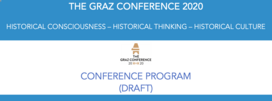V – The core concepts in their interrelation to (theories of) global political, social, economic or cultural developments
While the trend in the development of the ‘second-order’ concepts of historical education/history didactics can be traced over the past decades with reference to relevant publications in the field, the interrelation between ‘first-order concepts’ of historiography and ‘second-order concepts’ of historical thinking and historical education has not been so well described, and seems even to having been neglected over this period by reflection and research in the various communities.
Reflecting upon history education without taking into account the relation to the concrete content and the factual context of historical narratives, however, might die away the theoretical debate on historical education. Criticism which had been applied to the educational theories in former decades might come back to history didactics, when just focusing on second order concepts.
In addition, the approach in this section should be linked with the actual big challenges in history didactics/historical education with regard to global societal and political developments. This could imply the goal to make the terminology of the core concepts more robust as concerns
- the support and development of the historically thinking citizens,
- the interrelation between citizenship education and historical education,
- the development of sustainability and social responsibility through history education,
- the work on historical narratives in the and for the intercultural societies.
Intercultural comparative questions at the conference for developing the core concepts and terminology in a global perspective could therefore comprise the following:
- Is there an impact of (theories of) political history(ies) on the core concepts?
- What is the impact of economic and social history or area studies on the core concepts?
- What is the impact of intercultural approaches such as gender studies, public-private histories, every-day life history, new cultural studies on the core concepts?
- What is the impact of transnational approaches, such as narratives on Shoah, genocide, on the core concepts of history didactics/historical education?
- Are there discourses on ‘global history’ which are related to the core concepts of ‘historical consciousness’, ‘historical thinking’ or ‘historical culture’?
Conference Office
Alois Ecker
Institute of History
Heinrichstraße 26/II
8010 Graz
Institute of History
Heinrichstraße 26/II
8010 Graz
Benjamin Ecker
Institute of History
Heinrichstraße 26/II
8010 Graz
CONFERENCE OFFICE
grazconference2020(at)uni-graz.at
+43 699 19221739
Bettina Paireder
Alois Ecker
Benjamin Ecker



